Hello everyone! Here we meet again for the lesson of learning the Japanese phrase “Naruhodo! as you might hear when you watch anime or J-drama. Naruhodo is a very easy to use phrase that is often used by many Japanese in their daily life conversation, although this phrase is rarely found in the textbook if you are learning Japanese with the books.
Do you know what Naruhodo means? What kinds of situations fit this phrase? Although this super-simple word is commonly used, sometimes this phrase is not always perfect for certain situations. How to use it correctly to avoid awkward moments as well as to maintain a good atmosphere when talking to someone who is older or has a higher position than us, especially in the work place, for example. Therefore, sometimes it is best to be careful when saying or expressing this word.
Let’s learn what Naruhodo means, how to use it, and see examples of sentences and situations that fit these sentences. Learning how to use naruhodo correctly could be very important for you to make your Japanese sound very natural and beautiful.
In addition, as mentioned earlier, you will also be able to avoid misusing the word, which could be a problem for you someday. Why is that? Because the word “Naruhodo” can be considered rude or impolite when used in such business situations for someone who has a higher position than us. So let’s start by discussing what Naruhodo means in the first place.
Further, if you are currently learning important and frequently used phrases in everyday Japanese, please also read the article below:
What is the meaning of “Hajimemashite (はじめまして)”
What is “Kabedon (壁ドン)”: The Japanese Unwritten Culture
What’s the Meaning of “Sasuga” (さすが)?
Contents
1. What is the Meaning of Naruhodo?
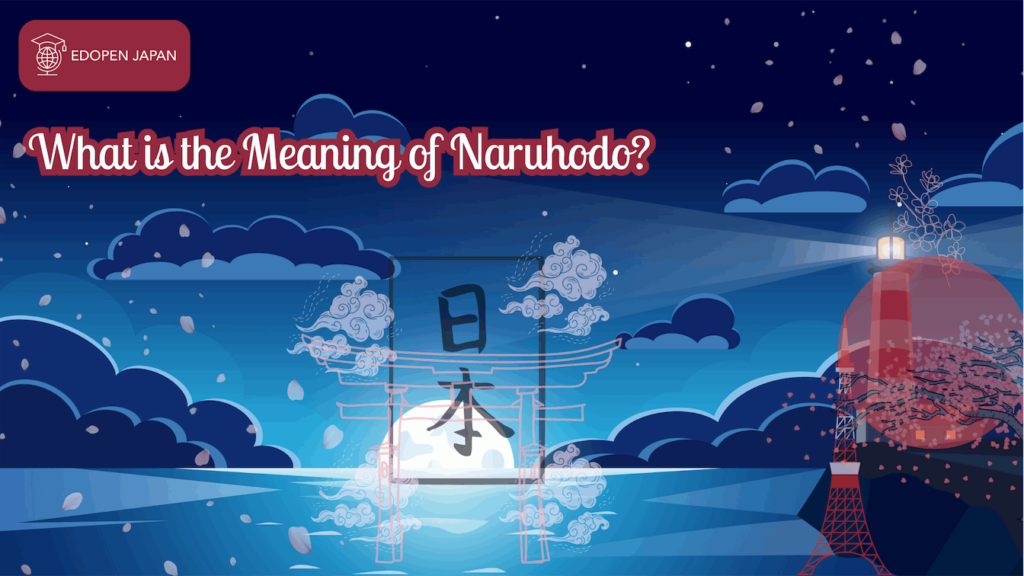
First, let’s open the dictionary and look up the meaning in Japanese. According to the Dictionary, the meaning of Naruhodo is as follows,
- Accept the words of others and show that you agree. Surely or really. “I see, that’s good.”
- Show the intention to do as much as possible within this area. As much as possible.
- Then express the feeling of agreement with the other person’s words. “I see. You’re right.”
If you want to find the meaning of a particular Japanese phrase, it is best to look it up in the Japanese version of the dictionary. We recommend that you learn Japanese to be able to do this. If you are able to know basic Japanese and then you can search and get as many details as possible meaning rather you prefer the English version website etc.
In this way, “I see” is often used to express that you are satisfied with the other party’s opinion or to express your appreciation and sympathy.
Furthermore, we can assume that “naruhodo” also has the same meaning as “I see, I agree, indeed. This expression is used when we are satisfied with someone else’s explanation or new knowledge we have just received from that person that we did not get before.
Or it is an expression that is spoken when you give an agreement “you already get it after hearing such a clear explanation” to the other person’s story, and it is a word that expresses “a feeling of agreeing with others by showing that you did not notice it before.
For your information, the original meaning of Naruhodo is not “I see,” but “as much as possible” or “as hard as possible. It is believed that “as much as possible” came to be used in the sense of “yes” from the meaning of “there is nothing more. Nowadays it is mostly used as a term of agreement, understanding, and conviction.
2. Naruhodo in English
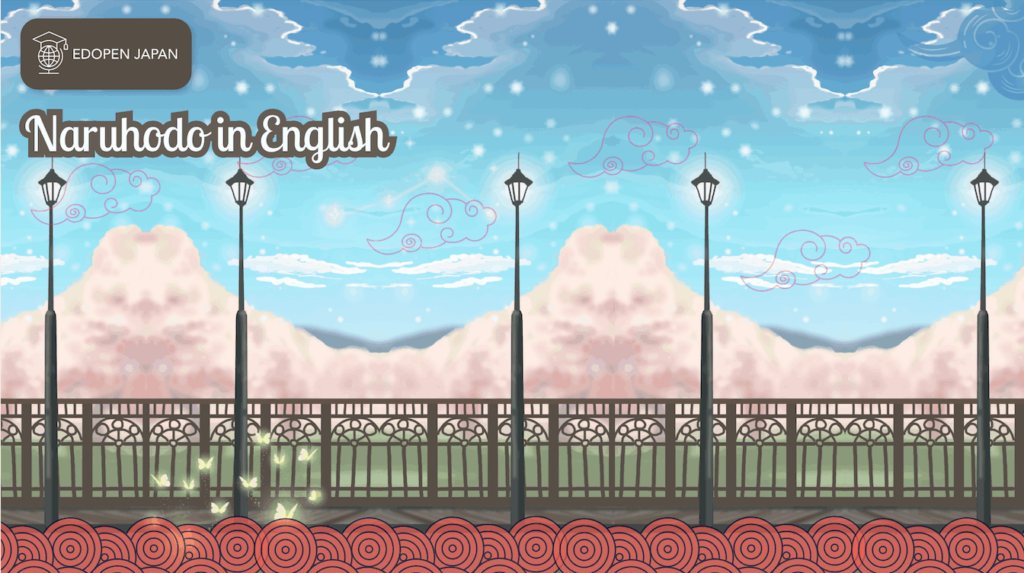
Although naruhodo is the Japanese phrase (adverb or expression), we also need to know what is the most appropriate literal translation of naruhodo in English, right?!! As stated in the previous part, we can conclude that naruhodo can be translated into English as the following phrases depending on the situation:
- I see, that’s good.
- I see, I agree.
- I see, You are right.
- That’s right.
- Indeed.
- Ahh, I see.
- Ahh, I get it now.
- I understand.
- That makes sense.
- I see what you mean.
The above translations are appropriate for certain situations. All of these expressions are used to indicate that you are convinced and agree with what the other person is saying, and you can consider yourself almost in agreement as well.
3. The Etymology of Naruhodo
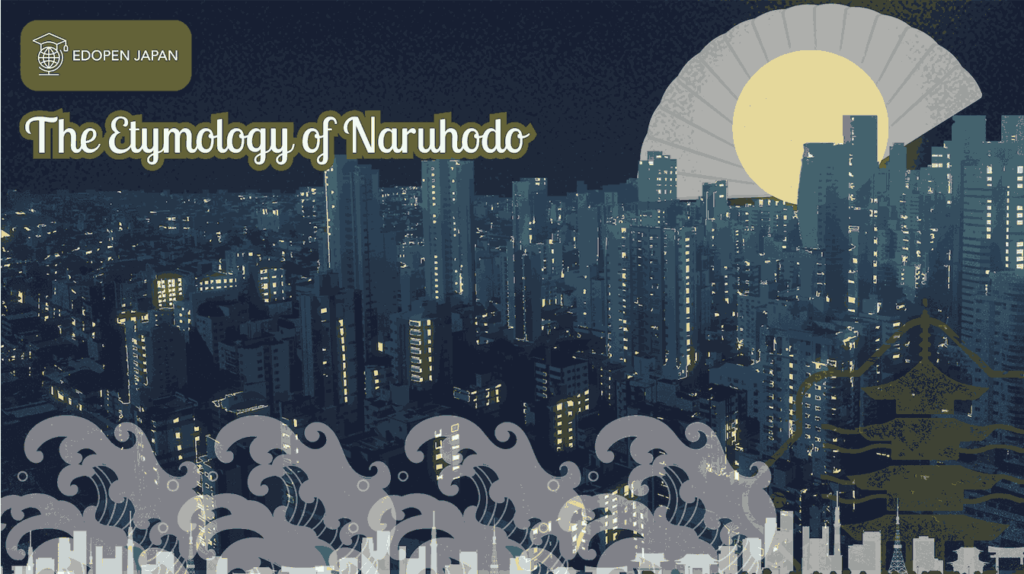
Naruhodo is written as “成程” in Chinese characters (Japanese Kanji). However, Naruhodo is often written as なるほど in hiragana.
Let’s break down the above Japanese kanji and look at each meaning to know the meaning of naruhodo originally from the characters. The word naruhodo consists of 2 kanji, 成る (なるーnaru) and 程 (ほどーhodo).
- 成(naru): A word that means “completed” or “success.”
- 程(hodo): An expression for “magnitude” or the “degree” or the “level” of something.
We could assume that naruhodo means “to confirm that something has been done,” and we have to recognize that this is the most common way it’s been used lately.
So again, when someone tells you new information and you give your response to them, you might want to casually acknowledge/agree with them, right? and then saying “naruhodo” would work well.
4. Synonyms of Naruhodo
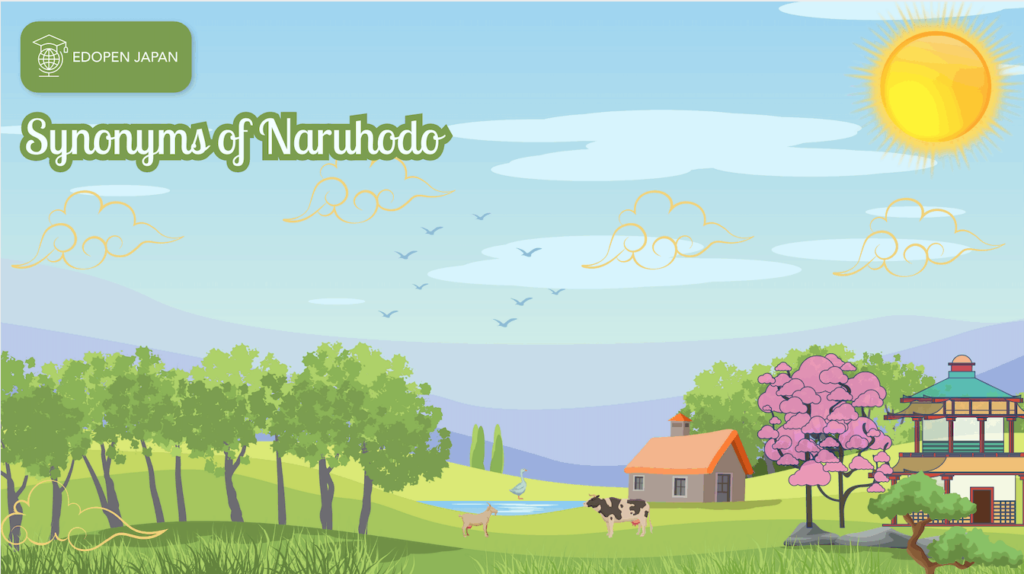
In this section, we’ll learn what kind of expressions have a similar meaning to “naruhodo”? For example, taking into account the fact that you are satisfied with the other party’s opinion, instead of saying “Naruhodo” you can also say:
- “Reasonably (道理でーdōride in Japanese)”
- “Certainly (確かにーtashikani)”.
All of these two expressions have the same meaning of agreement.
On the other hand, if the other person points out something that you originally expected to some extent and assumes a situation where you have deepened your understanding, expressions such as:
- “After all (やはりーyahari)”
- “As expected (思った通りーomotta-tōri)”
- And “as expected (mikomi-dōri)” are the best synonyms for “naruhodo”.
Please feel free to decide which is the best phrase for you!
5. Is Saying Naruhodo Rude?

As briefly mentioned above, it can be rude to use “naruhodo” when we use it to respond to what superiors have done, especially in the business world.
In addition, some people may not be able to understand why “naruhodo” is considered a rude expression in this case. Many people may feel that it should not be rude because they are confirming the other party’s opinion, and it is common.
However, this expression “naruhodo” originally has the nuance that superiors or someone in a higher position evaluates their opinions toward the current ones, not vice versa. Therefore, we should keep this point in mind. Do not use “naruhodo” for someone who has a higher position than us.
Otherwise, it will be misunderstood and bring out the bad nuance, such as making you feel as if you are evaluating your superiors’ work when you are strictly forbidden to do so.
In the business world, using “naruhodo” in conversations with your colleagues, business partners, and even your boss can be considered rude for the same reasons as above. Also, if you use “naruhodo” too many times during the conversation. You may be considered as not listening carefully to your partners and not appreciating their thoughts as well, so it is much better to avoid this phrase in business.
6. Respectful Expressions Instead of Saying Naruhodo
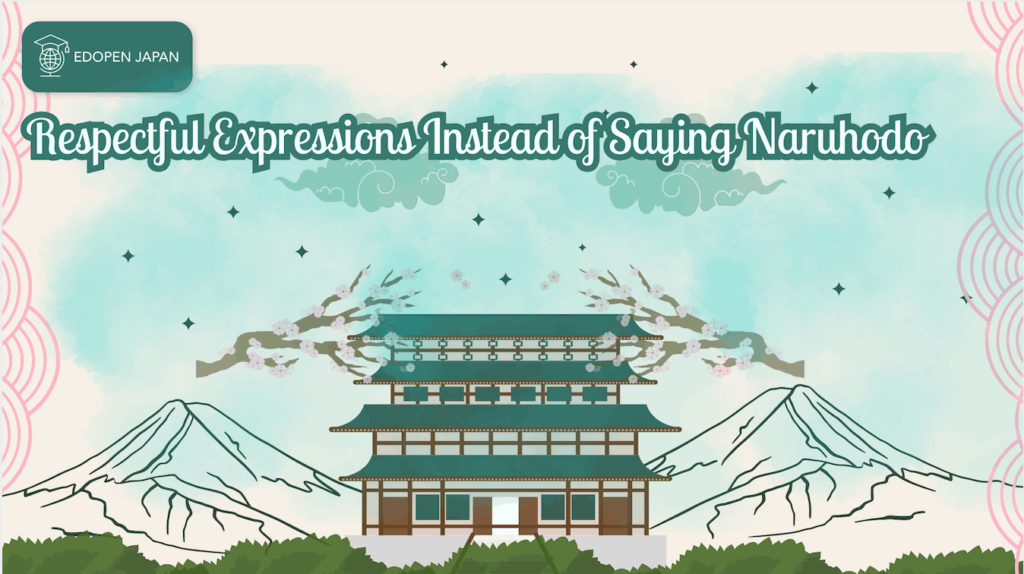
Next, you might ask, what kind of expression should we use when we want to show our agreement or conviction or even our polite response to superiors or in business?
The easiest is “はいーhai or yes”. Instead of using “naruhodo”, please try to use “はいーhai or yes” instead. Although sometimes it might be awkward and not enough to express that we understand and fully grasp the point.
Therefore, instead of using “はいーhai or yes” repeatedly, it is highly recommended to train and manage ourselves to be close until we are able to spontaneously use the following expressions such as:
- 承知いたしました (しょうちいたしました) or shōchiitashimashita: I understand
- おっしゃるとおりでございます or ossharu tōride gozaimasu: You are right
- はい、分かりました (はい, わかりました) or hai, wakarimashita: Yes, I understand
- かしこまりました or kashikomarimashita: I understand.
- 同感です (どうかんでございます) or Dōkande gozaimasu: I feel the same way or I agree
- 確かに~ (たしかに~) or Tashika ni~: Surely~
- そうでございます or soude gozaimasu: That is right.
Even if the word “naruhodo” sometimes comes out spontaneously in the first voice, it would be nice to train and manage yourself to use these expressions as much as possible, because such rude impressions will be diminished by persistently continuing to use these expressions.
Summary
In this last section, after discussing the meaning, etymology, and honorifics of “Naruhodo,” we can summarize several points that we can summarize as follows:
- “Naruhodo” is a Japanese phrase used to express the feeling of agreement within the main conversation.
- “Naruhodo” is written in Japanese characters as “成る程 (in Kanji) or なるほど (in Hiragana)”.
- “Naruhodo” not only has the meaning of agreement, but also has the nuance of “evaluating the other person’s story or thought,” so it is not appropriate to use it for someone in higher positions or superiors.
- Naruhodo” in English has several meanings, including “I see,” “I agree,” “that makes sense,” etc., depending on the situation..
- There are several more beautiful and highly recommended phrases to use instead of “naruhodo,” such as “shōchiitashimashita: I understand” or “ossharu tōride gozaimasu: You are right” or “kashikomarimashita: I understand” and so on to make good nuance and avoid misuse even misunderstanding in the formal conversations.

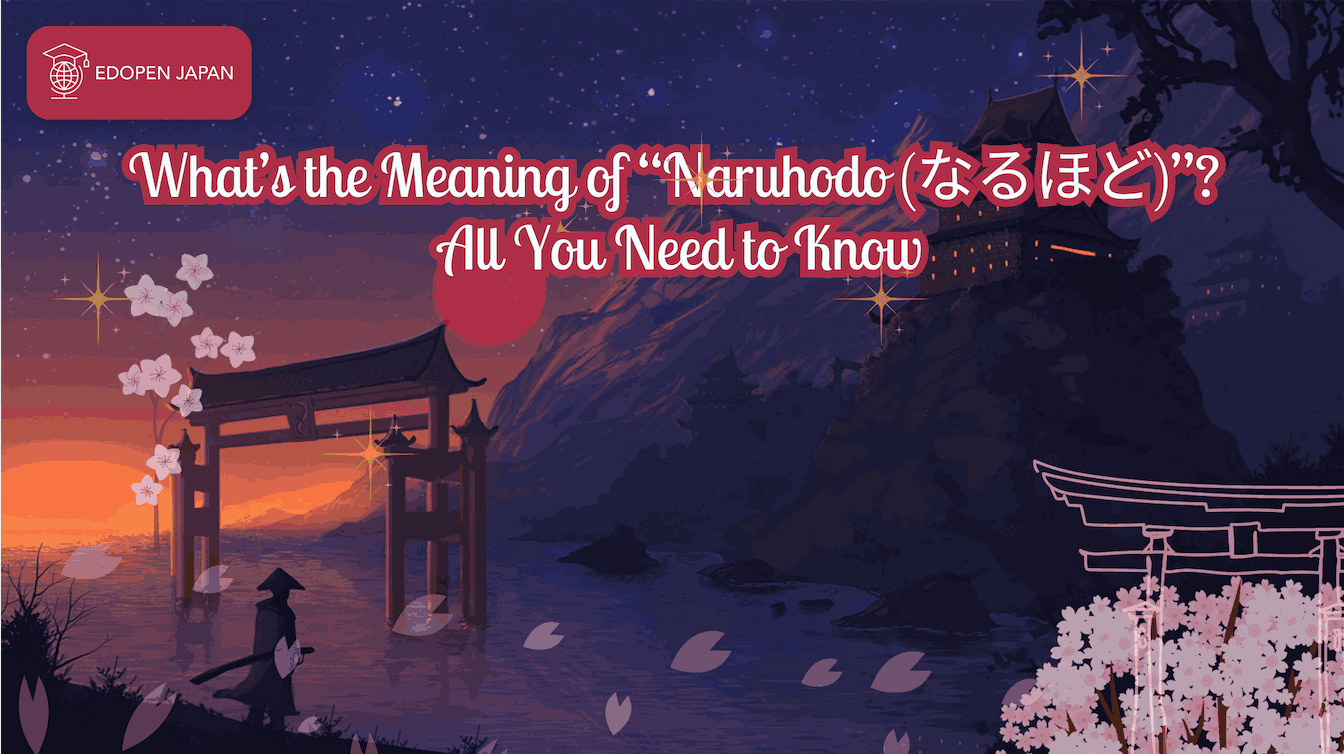












Leave a Reply